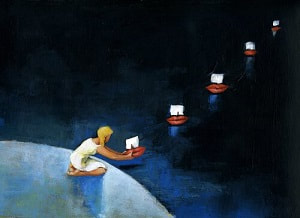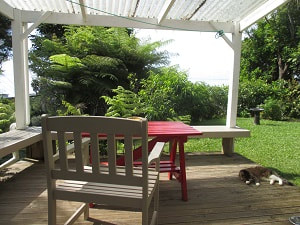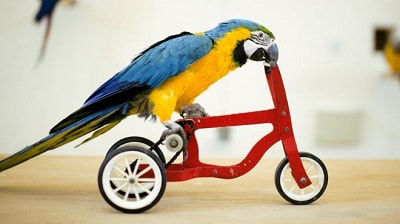 Isabel Allende is one of my favourite writers. In November she was given yet another award, honoured by America's National Book Foundation for her distinguished contribution to American letters, the first such award given to a Spanish-language writer. Allende gave an acceptance speech for her award and mentioned how being 'chronically uprooted' has inspired her creativity. Themes of 'nostalgia, loss and separation' can be found in all of her books and also define her writing process: 'As a stranger ... I observe and listen carefully. I ask questions and I question everything. For my writing, I don't need to invent much; I look around and take notes. I'm a collector of experiences.' I kept a 'writer's notebook' for years. It went with me everywhere and I scratched down things that I saw or heard. I didn't use most of the stuff I wrote down but some I did. When I was working as a courier in Atlanta, Georgia, I sometimes had to run out of town and up into the northern part of the state to places like Calhoun and Rome. I passed lots of billboards along the side of the country roads. One in particular stayed with me and went into my notebook: God recycles junk souls. I used it as the title of a short story. Even though I was very young when we left the USA to move to New Zealand, I do remember some of of our life in the 60s over there: watching American Bandstand with Dick Clark on TV, rock n'roll music, going to the drive-in movies. And those memories generate some of that nostalgia Allende refers to. I wasn't 'chronically uprooted' as she was, but I was uprooted at a young age from everything I knew and all that was normal to me, put on a ship for a voyage across the Pacific, and then placed in an alien environment where even the flushing of the frightening 'thunderbox' toilet scared me to death. This uprooting made me an observer at the age of 8. I'd always had a tendency to be shy and quiet, and when we came to New Zealand, things were so different, the children I met so unusual with their funny accents and marmite-white-bread sandwiches, I retreated. I sat, watched, said little, asked some questions, and learned how to fit in through careful observation. Of course they thought I was totally weird too with my funny accent and peanut butter and jam sandwiches. When I return to the USA for visits, I'm hit with that sweet/sad feeling when I see something I remember from years ago: it might well be that old billboard, or the sight of our family home in Seahurst (Seattle) where we lived (the house looks different now but there's enough left to inspire memory) and walk down the street of that old neighbourhood. The sense of nostalgia that often comes with childhood memories, of loss and separation, made more profound if that childhood had a dislocation or major change, a move from one country to another for whatever reason, can be a powerful source of emotion for our stories. Childhood memories are often fragmentary, wispy sensations lingering in the background, snippets of things said or done. So keep a notebook. Jot them down as they come to you. Use them as the basis for your life stories.
0 Comments
 And I don't mean gun triggers. I mean those everyday things that can trigger a memory, a sensation, an emotion. These triggers can be the true stuff of life writing. Take this morning. I brew up the coffee and put some bread in the toaster. The toast pops out and as I am buttering it, I remember my secondary school English teacher. I didn't like English when I was at school. Even though this teacher was one of the best I've ever had the good fortune to know, I didn't really like going to her classroom. It wasn't her, it was the subject. However I've always considered her to be one of my mentors, someone who had a keen interest in my writing and took the time to actively support and encourage me. Indeed her interest in my writing continued after I left school, and goes on to this day along with a firm friendship we have enjoyed for so many years. So what does all this have to do with a piece of toast? Many years ago now, my teacher and her husband were packing up their house to move away. In a case of bad timing, she broke her arm or wrist, I can't remember which, was in a cast and so couldn't do a whole lot of packing. I came over one day to help. When it was time for lunch, we downed tools and prepared some soup and toast. As I was buttering her pieces of toast, she said, watching me closely, 'Butter it right to the very edges.' Every morning, I butter the toast to the very edges so even the crusts are included. I could write a whole lot more about this very special teacher who invested so much of her kindness, patience, and energy into my writing at a time when it was so needed - and all it takes is a piece of toast and a spread of butter to get me thinking about those memories. Have a look around you right now. Are there some objects that trigger a memory for you? Perhaps it's the scent from a vase of flowers on the dining table that takes you back to a soft, shimmering summer day, or an expensive writing pen that your Dad gave you when you were 21 (remember how special that was because he so rarely gave you anything?), or something as simple as the way sunlight glints off a wave in the bay, reminding you of a sailing adventure on a small boat with someone you really didn't like too much. Be open to triggers, be watchful, be observant, jot the thoughts down in your notebook for later when you're looking for something to write about.  Writing can be joyous, momentous, creatively satisfying when it's going well ... but when it isn't, finding words can be impossible and the blank computer screen can be a vision from hell and the stuff of nightmares. There is of course the old 'writer's block' where you just can't get to first base with anything; it's like a creative constipation. Nothing is moving and you need some kind of 'laxative for creative people' - hey, there's an idea! I can see that on the retail shelves already. Then there are the times when I'm doing OK with my creative work but then 'life gets in the way' and something major happens. Maybe old Miss Betsy-cat gets worryingly sick, the plumbing goes bung or I'm unwell, then I develop a one-track focus. I give all of my attention to the problem and I cannot do any writing. I've always been like that. I don't multi-task too well. When this happens, I have to take time out. I take my lead from Betsy. She just lies down in the sun. With a 'writer's block situation' I have some tools I use to get started again but when there's a life issue, I have learned to ease up on the laxatives and just stop. It took me a long time to convince myself that this was OK because I always believed I should be able to write, no matter what else was going on in my life. That is still mostly true because if we let life overtake us we would never write a word. But when there is a life event that requires my focus to really be there, right with it, then I stop and that is OK. When the going gets tough, the tough sack out. It's OK to to take time out. If you can't write because your emotions and concern are elsewhere, do whatever you need to do to take it easy ... and give yourself permission. I am jolly lucky because I can sit out on the deck and look at the sea or the trees and the birds and I feel surrounded by friends and comfort. And always remember that tomorrow is another day. You can try again.  Do you remember the first time you rode a bike? I was about ten. Mom had a bike that she'd brought over from the USA when we immigrated to New Zealand. It was black with two large wire baskets hooked onto the back of the frame, deep enough for all your shopping. Dad was building a sailboat in the garage at the time. He'd done that before in the garage of our house in Seattle. That sailboat was about 23 feet long and it was called Nameless. Unfortunately the New Zealand version was never completed but I used it's skeleton to help me learn to ride. The wooden ribs of the boat were laid out in the garage. I'd get on the bike and propel myself from rib to rib, trying to balance in between. Eventually I could ride past two ribs, then three, and finally I could truck along without having to prop myself up. I had my fair share of tragedies on that bicycle, including a very notable occasion when I was showing off, as one does, had to brake suddenly, and the bike came right out from under me and I ended up on my bottom holding the bike up in front of me. Mom always said, 'Once you learn to ride, you never forget' and that's true. I still have a bike and can hop on and off and ride around quite happily. It's a lifetime skill. Writing is a bit like learning to ride. You start off small, trying to get your balance, learn the nuts and bolts of staying on and staying upright, using props and whatever else you need to make headway. You acquire the skill and of course, practice is the key - keep going until you find your momentum. Sometimes it's tough, like riding up a steep hill when the going is slow (even with gears), the exertion intense, until you get to the top and you can take a deep breath and appreciate your accomplishment. And then there are the times when you fall off, have a 'crash up' as we used to say when we were 10-year olds wheeling around; the wheels well and truly come off the writing caravan. But writing can be a delight, an enjoyment right up there with cycling along on a balmy spring day with the scent of new flowers and the warmth of sunshine on your arms. Writing is a journey, an excursion, a time of discovery. And of course, as my Mom used to say about so many things, 'It's just like riding a bike - you never forget how' - writing is like that. It can be a lifelong companion, a solace, a joy, a way to communicate your vision and what life is like in your world. |
Archives
January 2024
|